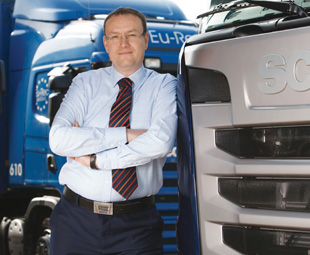Triumphing over tough times?

Some say that the world is overcoming the effects of the recent recession, while others warn that we shouldn’t jump the gun … One thing is certain – it has changed how business is done. We take a look at how the commercial-vehicle finance and insurance industries have been affected.
The recession, or the general economic decline, that hit the world markets around the end of the first decade of the 21st century (its exact scale and timing is still being debated), varied from country to country. Its affects rocked the world, however.
In terms of overall impact, the International Monetary Fund (IMF) concluded that it was the worst global recession since the Second World War.
“In general, there is always a flipside to the coin,” says Petr Novotny, managing director of Scania Finance and Insurance. “The aftershock has led to a search for efficiencies within the commercial automotive sector. This directly influences all parts of the value chain, to which the finance and insurance business, undoubtedly, belongs.”
He adds that operators also became more eager to understand the total cost of operation and total operating economy of their fleets. “These areas are crucial, and are the first step in order to create sustainable, long-lasting transport solutions.”
Novotny continues: “At the same time, due to the perceived high risk to the financial market, customers and banking institutions suffered from lack of access to financial resources and liquidity during the crisis years.”
He emphasises that this wasn’t an easy situation. “It created a shift, however, where customers turned to alternative means of finance, such as finance provided by original equipment manufacturers, leasing and insurance solutions,” Novotny tells FOCUS.
“This alternative to the traditional financial institutions helped to ease the tough market situation and increased market liquidity in the automotive business sector.” It also led to a number of benefits for the commercial vehicle market …
“Scania Finance and Insurance offers a flexible and customer-need-based approach,” “This emphasises some very important parameters such as one customer one account, dedicated customer approach and focus on total operating economy when offering Scania products, services and finance/insurance. No silos, no politics, no hot potatoes … ”
He adds that Scania believes this holistic strategy will help its customers to become more profitable, more efficient and spend less time and effort on administration and operating processes – “so that they can focus on the core areas of their businesses”.
 So the recession wasn’t all evil, necessarily, but it did leave its mark … “The market recovery was relatively quick in terms of volume, but other areas took far longer to recover,” Novotny points out. “Prices of used vehicles, for example, remained at lower levels for years.”
So the recession wasn’t all evil, necessarily, but it did leave its mark … “The market recovery was relatively quick in terms of volume, but other areas took far longer to recover,” Novotny points out. “Prices of used vehicles, for example, remained at lower levels for years.”
He continues: “Higher market risk had a negative effect on the levels of lease payments to logistics providers, and consequently, on total cost of operations. The financial sectors are now much better prepared to tackle financial or operational rises, due to active involvement with the transportation companies and better understanding of rewards and risks in the commercial vehicle operations.”
This is a good thing, as 2015 might have its own challenges in store … David Molapo, head of fleet management at Standard Bank, says that heavy economic storm clouds lie ahead for the South African fleet industry in the coming year. “The good news is that many local fleet operators have not yet begun to fully utilise the modern tools and technologies that can help them to weather the storm.”
He adds that those that have already implemented precision-management tools (not only the latest vehicular technology and telematics, but also management systems and services) are set to increase their competitive edge as South Africa enters a turbulent economic year.
“South Africa’s recent credit rating downgrade by Moody’s, from Baa1 to Baa2, combined with the end of quantitative easing, and the start of rising interest rates in the United States, is pushing down local business confidence,” Molapo points out.
These conditions are doing no favours to key sectors, such as manufacturing, and 2015 could possibly see South Africa lose further vehicle production contracts, among others, to more competitive manufacturing economies.
“Under current economic conditions, fleet managers are also given little time to plan for expanding their fleets, because new contracts tend to come in sporadically,” says Molapo. “As a result, mistakes, such as buying the wrong type of vehicle for the job, tend to increase.”
He adds that fleet managers need to budget for an inflation level of at least the current six percent. “Despite the gloomy outlook, fleet managers can ride out the year and emerge with a stronger, more efficient fleet – provided they fully embrace the systems and methods available on the market.”
One of these includes Standard Bank’s fleet card, which is vastly underutilised. Many fleet owners are simply “convenience users” and implement only one of the advantages – the fact that they no longer have to give cash to drivers to fill up. Meanwhile, a huge amount of information, in the form of automated reports, is available to fleet owners who take the time to access it.
By analysing fuel consumption and comparing it to national averages, for example, faults in vehicles, as well as driver behaviour, can be picked up. The resulting incremental savings could result in huge efficiencies, which give the fleet a competitive edge in difficult economic circumstances.
“The range of precision-management tools available to fleet managers is unprecedented,” says Molapo. “On the technological side, telematics can now give detailed analysis of vehicle performance and driver behaviour.”
The future also looks promising for the finance and insurance industries. “I personally expect further integration with the automotive value chain, resulting in more efficient processes and higher value offerings to end customers,” Novotny tells FOCUS.
“I think we will see a shift towards transporters buying transport capacity at a fixed fee,” he continues. “In this solution you have the whole package: full vehicle maintenance including; parts, insurance, finance, fleet management systems and driver support … with a predefined uptime guarantee at a fixed rate per kilometre or tonne.”
Novotny points out that transporters need only add drivers’ salaries and the cost of fuel to total cost of operation when calculating cost per kilometre.
Published by
Focus on Transport
focusmagsa




